
29 minute read
News
No excuse for EMD abuse campaign update
In December 2020, the Queensland Ambulance Service (QAS) launched a social media campaign to educate the general public about the abuse our Emergency Medical Dispatchers (EMDs) receive when taking Triple Zero (000) calls and the effect this has on our employees.
Advertisement
Assistant Commissioner, State Operations Centres Peter Warrener said sadly, our hard-working EMDs continue to receive verbal abuse from patients or the patient’s advocate when they are entering the Health System via Triple Zero (000). “Lately, I have listened to calls where the caller has just taken their frustration totally out on the EMD, who was so polite, respectful and only wanted to help with getting the vital information to dispatch an ambulance,’’ Peter said. “I think it’s so wrong that this abusive/frustrating tone of the caller continues on a regular basis for our staff.
“Within Operations Centres, we are strongly encouraging our staff to report these types of situations via the SHE system along with the social media campaign that was recently undertaken to stress the importance that there is no excuse for abuse.
Peter said when the subject gets discussed with QAS staff, a comment I get is that ‘the patient wasn’t abusive, they were stressed which uplifted their communication tone and directness’.”
“While this may happen on some occasions, the State Operations Centre is wanting to provide some more assistance through education and we are currently working with our Mental Health Response Program Director Sandra Garner on a future education package for EMDs about how communication styles may be able to de-escalate a caller’s anxiety so the right information can be obtained for the right ambulance to be deployed to the right address,” he said.
Below, left and right
■ Peter Warrener. ■ EMDs are strongly encouraged to report any abusive behaviour when taking Triple Zero (000) calls.




ASM recipients
An incredible combined 116 years of service was celebrated in January with three QAS officers announced as Ambulance Service Medal (ASM) recipients in the Australia Day 2021 Honours List.
Advanced Care Paramedics Gary Cotterill, Gene Curtis and Julie Calvert will receive the prestigious ASM which recognises distinguished and outstanding service by the men and women of Australia’s ambulance organisations. It is acknowledgement of their outstanding service to the community and as role models within the QAS. Gary works at Childers Ambulance Station and is celebrating 42 years of ambulance service in Queensland. He began his career as an Ambulance Officer in 1979 at the Queensland Ambulance Transport Brigade (QATB) in Brisbane. He is highly valued and respected by the Childers and broader Queensland community, his peers and the QAS. Gary initially retired two years ago but missed the teal uniform and his job so much he returned to his duties as a paramedic after a short retirement stint. Gene is based at Bowen Ambulance Station and has served in the QAS for more than four decades, commencing as an Honorary Ambulance Officer with the QATB in Cloncurry in 1979. He has held many different roles, including an 11-year stint as the Officer-in-Charge of Collinsville Ambulance Station. Paramedic Julie Calvert is based at Cleveland Ambulance Station and has diligently served the Brisbane community for more than 32 years. She commenced her operational career with Queensland ambulance in 1989 as an Ambulance Officer.
Top to bottom
■ Gary Cotterill, Gene Curtis and Julie Calvert.
Falls program makes lasting impression
An innovative QAS program aimed at preventing elderly people from falls, continues to make a lasting impression in the Metro North Local Ambulance Service Network (LASN) almost two years after being implemented. The Community Falls Follow Up Program is a partnership between Metro North HHS Community and Oral Health (COH), Brisbane North Primary Health Network (PHN) and the QAS.
Late last year the project was Highly Commended in the Excellence in Integrated Care category at the Metro North HHS Staff Excellence Awards.
The project was established in response to an identified need to respond to an increasing number of people aged over 65 who fell in the community, required assistance and assessment from the QAS but did not require transfer to hospital for immediate treatment. It was further identified that many of these people had multiple subsequent falls resulting in a QAS response but were having no further assessment and treatment to prevent or at the very least limit further falls.
The program works by paramedics referring eligible patients to the program, with the patients then provided with multiple services. The PHN service referrals are actioned within 48 hours of receipt and a face-to-face visit is conducted within five days of referral. Metro North LASN paramedics made more than 400 referrals to the program, of which more than 200 cases were accepted for further care from COH and PHN. Critical Care Paramedic and Clinical Support Officer Wayne Loudon, who participated in a video for the falls program to be released soon, routinely uses the service and said he ‘would strongly encourage all paramedics to contribute to preventative health care through initiatives such as the falls referral’.
“Paramedics are one of the few health professionals that can assess and care for vulnerable persons within their own home. This gives us a unique opportunity to not just be reactive to health care needs but to be proactive,” Wayne said. “There is clear evidence that shows seemingly benign falls without injury warrant further investigation since they may indicate a subtle underlying social, psychological or medical need or in fact be the precursor to a more serious fall. With the one-year mortality rate being as high as 58 per cent following these falls, prevention is better than acute care.”
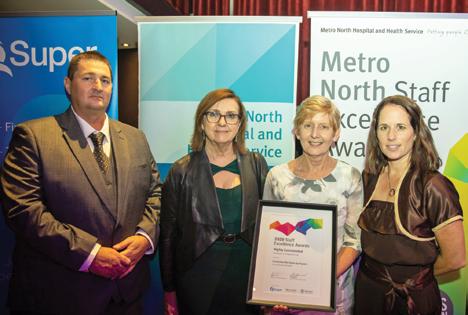
Above
■ Matthew Green (QAS), Sharon Gavioli (PHN), Mary Wheeldon and
Kate Schultz (Metro North HHS COH) at the Metro North HHS Staff
Excellence Awards presentation.
Urraween Ambulance Station opening
Urraween Ambulance Station became our second ambulance station in the Hervey Bay township after the new facility was officially opened on 3 March by QAS Deputy Commissioner Dee Taylor-Dutton and Assistant Minister for Health and Regional Health Infrastructure Julieanne Gilbert MP. The $3.2 million project provides first-class amenities, with 16 Advanced Care Paramedics, an Officer-in-Charge and an Indigenous Cadet calling the new station home.
Urraween provides a 24-hour rapid response to the developing areas of Booral and River Heads, Dundowran Beach and Craignish and further afield to Toogoom and Burrum Heads while supporting the existing Hervey Bay Ambulance Station. Wide Bay QAS staff, locals, Members of Parliament, fellow emergency service agencies and the Hervey Bay Local Ambulance Committee attended the launch. A special mention goes to Aunty Karen Blackman and the Butchulla community for performing a great Welcome to Country and smoking ceremony. Aunty Karen also contributed an impressive Indigenous artwork to the station. This piece creatively depicts the region’s emergency health services and the community they protect.


New training promotes safe workplace culture
The Priority One RESPECT Training was originally developed to provide education around sexual harassment to the Fair and Inclusive Practice Network (FIPN) and the Senior Executives. At the end of the day’s training, Commissioner Russell Bowles felt that the discussion and learning that was had throughout the day should not be limited to only those two groups. He felt that it should be delivered to all staff across the state, regardless of work role within the organisation.
Above
Priority One Director
Todd Wehr.
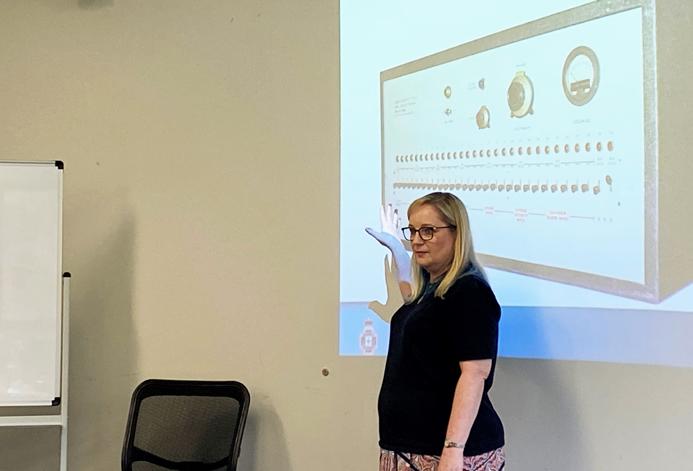
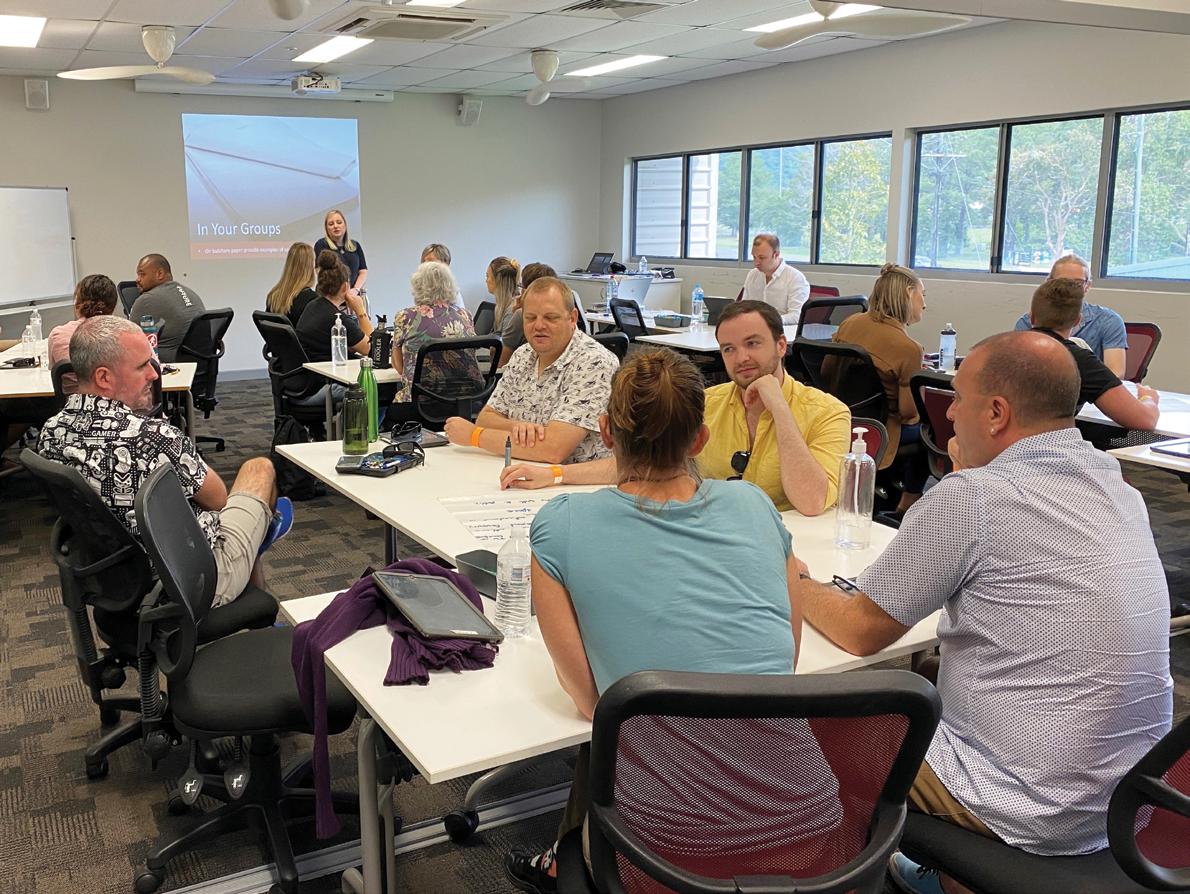

After picking myself up off the floor aware of the size of the task ahead, I recognised that this was an excellent opportunity to potentially prevent psychological injury from occurring in the first instance. Over the past 30 years, Priority One has been providing support to staff who have experienced harassment from their colleagues, as well as support to staff who have been alleged to have harassed their colleagues. I know that not all these instances were intentional and that most of our colleagues don’t go to work with the intention of deliberately wanting to harm their peers. But sadly, sometimes that is what happens. The training is now beginning to be rolled out across the state after a number of pilot sessions in the south east corner and Far North Queensland.
Designed to examine the psychological underpinnings in relation to sexual harassment, the training delves into the importance of our role in creating a workplace culture where everyone feels valued and safe. It does this through discussion and exercises designed to open communication in a safe environment. Some people have expressed concerns that this is a push for political correctness and that we can no longer talk freely and have fun in the workplace. That is not the intention of the training. The training is designed to open communication so that people can know and understand what their colleagues find confronting. There is also no reason why you still cannot have fun. Having fun in the work environment is an important way of reducing stress and improving wellbeing, as long as it is not at the expense or exclusion of someone else. People should not be harmed in order to have fun.

At some point over the next twelve months you will have the opportunity to do the training and I hope that you will experience what many others have experienced so far. That this is an informative and empowering opportunity to create a workplace culture that we can all feel safe within and proud to be a part of.
Opposite, top
Priority One Psychologist Kirstine Britton in Cairns demonstrating how given the environment even ‘good’ people might sometimes do bad things.
Opposite, background
The day provided opportunity for discussion and learning, not only from the facilitators but also from the participants within the group.
Above
Interactive exercises provided an opportunity for greater learning and awareness. The Cairns and Hinterland and Cape
York staff presented on why brown eye colour is superior.
Rostering flexibility in an Operational Environment
Balancing the diverse individual needs of staff with the service delivery of an ambulance organisation requires innovation and agility writes Darling Downs LASN Acting Assistant Commissioner Tony Armstrong.
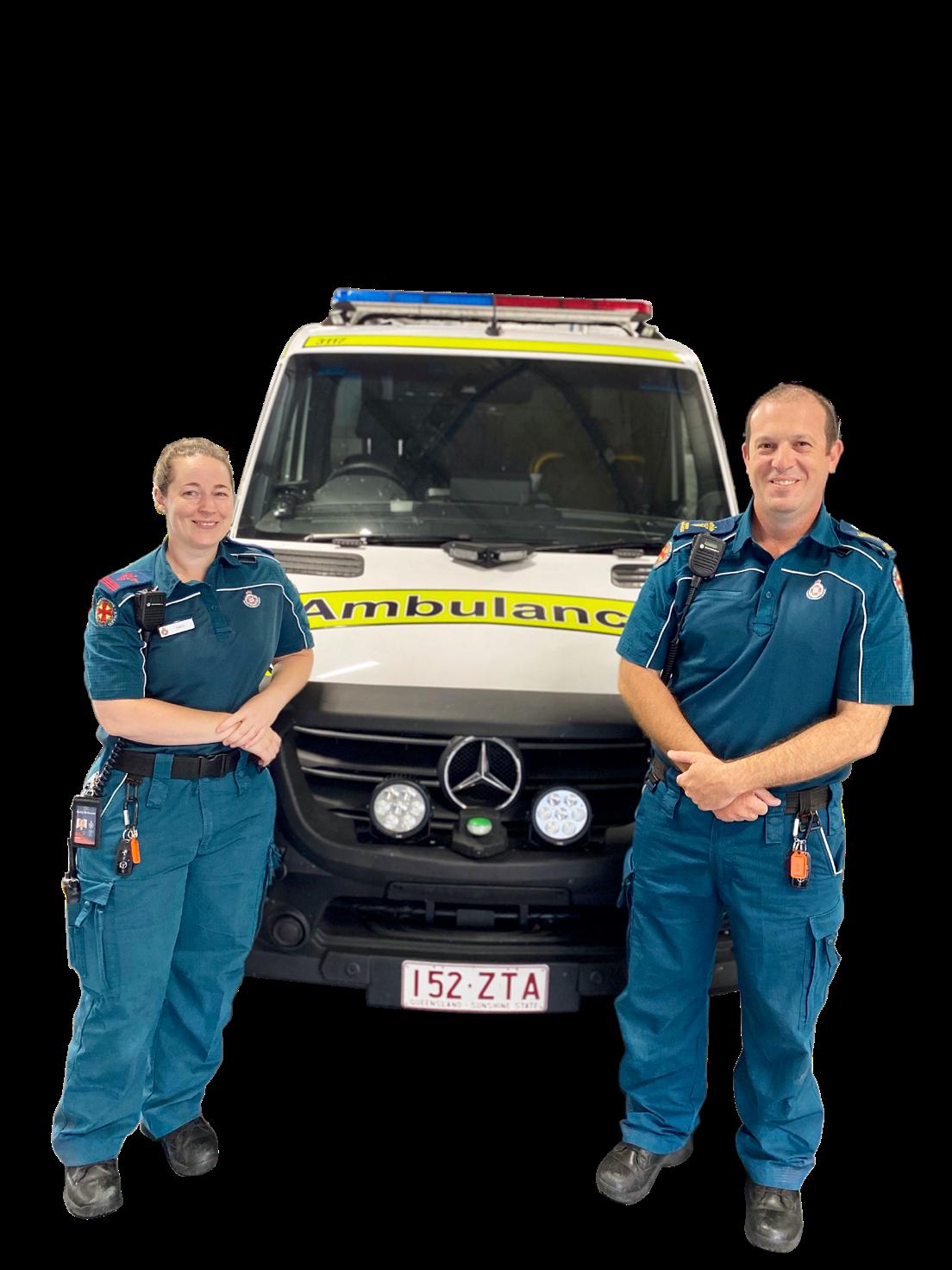
To respond and support service delivery to over 75,000 square kilometres with more than 300 staff working from 27 response locations affected by the tyranny of distance requires ongoing innovation to supplement traditional workforce models.
The opportunity to support the increasing requirements for staff flexibility has provided us the ability to do this.
Darling Downs LASN is providing flexibility through the development of dynamic, agile and innovative methods that help roster our people in a way that compliments the traditional approach. Our commitment recognises societal changes and the diverse workforce management practices required to balance competing personal and professional commitments of our staff with service delivery requirements. We have seen multi-faceted rostering solutions developed that promote workforce flexibility whilst aligning the provision of staff to operational demand. For a number of years now the ability to support staff accessing either a part time or fully flexible arrangement has continued to increase. Accommodating employees who need greater flexibility has resulted in the LASN adapting different workforce management practices and these are continually evolving to support individual needs and circumstances and provide coverage for changing demand profiles. A change underpinned by staff driven workforce management was implemented with the new Drayton Ambulance Station to Rostered Day Off (RDO) request-based methodology. This blends with traditional rostering practices to allow staff to self-select their days off over a roster projection cycle. Ultimately providing a balance for those who prefer a structured and consistent work pattern whilst promoting flexibility for staff to balance the complexities of their work/life balance. The model is still in its infancy and staff have provided a varying feedback with both positive and negative feedback continuing to drive innovation to explore options. Momentum is gaining across other Stations that are trialling roster variations that facilitates staff working nights only and the remainder working days and afternoons only. Some have moved to a mixture of part time and flexible shifts blended with traditional roster cycles that improve flexibility and support the 24/7 service delivery requirements and expectations of the community. Flexibility requires LASNs to consider the service demands of the community and incorporate varied rostering options that are adaptable to individual stations or groups of stations. Actively promoting flexibility within Darling Downs LASN can best be achieved with staff, Fair and Inclusive Practice Officers (FIPO), United Workers Union (UWU) delegates and management working collaboratively to develop solutions outside of traditional workforce practices.
Above
Acting Assistant
Commissioner
Tony Armstrong.
Opposite
Staff at the new
Drayton Station are among those in the
Darling Downs LASN trialling innovative rostering methods.
Above
Drayton Station exterior.
Promoting flexibility is everyone’s responsibility and here are some examples of strategies we are finding useful in achieving better outcomes:
• A focused mindset to challenge the ‘this how we have always done things around here’ way of thinking. • Employees, FIPOs,
UWU delegates and management all working together to develop solutions is essential. • Rarely is there a one fit solution. Rostering methodologies may need to be tailored to the service delivery area. • Balancing expectations, with flexibility comes offset. You may not get exactly what you require but with compromise you can achieve a balance for everyone. • Being part time or flexible full time can provide unique opportunities to support development opportunities. • Station flexibility starts with a conversation, consultation is important and you don’t need to wait for employees to ask, go first, look for areas that can accommodate increased flexibility in providing service delivery. • Don’t shy away from the challenge or get put off by traditional barriers.



Zak’s skills put to the test at challenging brain injury case
Insight Editor Jo Hales reports on Port Douglas Advanced Care Paramedic Zak Pitra’s challenging job involving a patient with a traumatic brain injury. Zak was the first paramedic on scene at Mowbray where he had to contend with a combative patient, communication issues and the unsettling knowledge that crocodiles were close by.
Patient Mylene (Mylo) Heidke, 30, was initially unresponsive when single responder officer Zak arrived on scene on 13 December 2020. She was lying face down in a pool of blood after coming off her electric scooter. Thankfully, some bystanders were monitoring Mylo, who had not been wearing a helmet.
“I asked the bystanders what happened as I got my gear out of the truck. It was immediately obvious she had a serious head injury,” Zak said.
“I could see soft boggy mass at the back of Mylo’s head and some spinal fluid leaking from her nose and ear. I knew straight away she would need to go to hospital by chopper.
“The problem was trying to get radio and satellite reception and mobile coverage. Mowbray has lots of communication blackspots. Where the crash occurred was surrounded by dense rainforest.”
On top of that, Zak was acutely aware they were in crocodile territory.
Not too far away was the infamous Mowbray River Bridge on the Captain Cook Highway and a viewing platform near the site where people stop to peek at the resident crocodiles sunbaking under the bridge. The Mowbray River is also connected to lots of creeks which the reptiles inhabit, one of which was very close to where the patient was located.
As Mylo entered in and out of consciousness, Zak got to work immobilising her spine with the help of the bystanders. However, his critically ill patient wasn’t making it easy.
“Mylo was being combative because of the head injury. Then when I got a cannula and line into her, she ripped them out and tore the collar off. She was like a wriggly worm,” Zak said.
Zak said when Mossman Indigenous Paramedic Program cadet Petrina Neller arrived, it was great having an extra set of hands.
“We got Mylo onto the stretcher and I asked Petrina to gently hold her in place without restraining her. I was worried if Mylo moved around too much, it could increase the cranial pressure and make the bleeding worse.
“Petrina followed instructions and did a great job.”
When he made contact with the communications centre, Zak requested the rescue chopper and said, ‘we need to get the patient out quick because if we don’t, she will die’.
One of the bystanders then assisted by driving the truck towards the highway to the chopper landing site where they would also have better reception, while Zak supervised Petrina and they provided patient care.
“Mylo was still extremely hard to manage so I decided to ring the Clinical Consultation and Advice Line to see if we could medicate her due to the cerebral agitation,” Zak said.
By the time the truck reached the meeting spot, more back up had arrived in the form of Mossman paramedics Tina Tucker and Anthony Wemm.
Above
■ Zak and Mylo in Mowbray at Mylo’s property.
Background
■ The beautiful Daintree Village is one of the many locations Zak has attended jobs in the Cairns and Hinterland LASN.
Opposite, clockwise from left
■ Zak loves working in the Cairns and Hinterland LASN. ■ Zak’s fur baby Milly gave birth to ten pups this year. ■ New Mum Milly at Zak’s Port Douglas home.
“It was such a breath of fresh air to have more people assisting and helping with the advanced care,” Zak said.
The consult line authorised Zak to administer Mylo with 10mg of Droperidol IV. This was followed by Fentanyl pain relief.
“The Droperidol worked within a minute and calmed her right down.”
Zak and the others assisted Rescue 510 chopper crew when they arrived on scene to airlift Mylo to Townsville Hospital in a critical condition. The Doctor Cath Tacon and Flight Critical Care Paramedic Lauretta Howarth intubated Mylo at the scene.
Zak later found out that Mylo had a skull fracture and subarachnoid haemorrhage.
After Mylo had been airlifted, there was still more drama to unfold when Zak and Petrina had an unwelcome encounter with a crocodile.
“After the job the truck was depleted and needed to be cleaned so we drove it to a spot further down the road and parked the truck,’’ Zak said.
“That’s when I noticed a crocodile stalking us.
“It would have been about 40 metres away. I’m not sure how long it had been there, but it was a bit unnerving.”
Not that Zak is a stranger to crocodile jobs.
In 2015, he inadvertently gained fame when responding to a Port Douglas golf course when one of the golfers was bitten on the leg by a crocodile while attempting to retrieve a golf ball in a water trap. Media coverage of the incident, which left the elderly patient with a deep laceration to his shin and puncture wounds to his calf, was beamed around the world and Zak was interviewed by multiple news organisations.
Zak recently reunited with Mylo who was later transferred to Cairns Hospital and was back home at the start of February.
Zak said he was amazed by how well she was recovering.
“Mylo is very lucky to be alive. She does have issues with taste and smell, and can only hear in one ear, but other than that, there are no neurological deficits, which is surprising due to the injuries she sustained.”
Zak said a grateful Mylo was extremely happy to see one of her teal angels and asked if she could hug him, while her brother and father expressed how thankful they were to all of those involved.
“This is one of the reasons I do what I do. I love being able to make a difference to the lives of people,” Zak said.
“I also love working for an organisation that is a leader in prehospital care.”
One of the clinical advances that has brought him much satisfaction was when Advanced Care Paramedics were allowed to administer patients with the clot busting drug Tenecteplase. In the early phases, Zak had his fair share of cases.

“One of the jobs involved a woman visiting from Melbourne,’’ Zak said.
“She had chest pain and after the 12-lead ECG it was discovered that her left anterior descending artery was blocked.
“I was the first on scene but when the other officer arrived, we administered Tenecteplase and it cleared the clot. At hospital she went straight into the catheter lab and had stents put in. A few days later she was able to fly back to Melbourne.”
Another job he attended was a patient in Port Douglas suffering from chest pain.
“On arrival it was obvious he was having a massive heart attack,’’ Zak said.
“I used Tenecteplase and we were able to clear the clot forming in his heart.
“It is such a wonderful feeling being able to provide our very ill patients with this level of care.’’
Zak started with the QAS in 2006.
He previously worked for the Emergency Services Telecommunications Authority which looks after communications for all services in Victoria and was stationed at Police Headquarters in Melbourne.
When he is not donning his teal uniform, Zak, and partner David, are busy caring for their fur baby Milly, who became a mother for the first time this year. Milly had 10 pups, sadly, one of the babies, the runt of the litter, did not survive.
There was no shortage of people putting their hands up for the pups, with the remainder of the litter, apart from one called Zeus, distributed to Zak’s QAS and Queensland Police Service colleagues once they were old enough to be weaned off Mum.
While it was hard to part with the pups, Zak said he and David are grateful for Milly and Zeus and are looking forward to some extra sleep.
“Helping Milly with the pups was rewarding but also exhausting,’’ Zak said.



QAS achievers receive top honours in ambulance awards




Wendy Lowes
Director, Human Resource Services
Wendy originally commenced in the public service in 1990 as an Administration Officer (AO1) with the QATB. Over the last 30 years, Wendy has performed roles across all facets of HR, starting in payroll, recruitment, establishment management, providing HR advice and support to senior management, executives and staff. Wendy has successfully led and managed several high performing teams throughout her career and was permanently appointed to the role of Director Human Resource Services in 2018.
Natasha Adams
Senior Critical Care Paramedic– High Acuity Response Unit officer
Tash commenced her career with the QAS as a student paramedic completing a BHSc Paramedicine before starting at Beenleigh Station in August 2007. She then progressed through a variety of senior education and clinical roles. Tash became a CCP in 2013 after completing a Graduate Diploma (CCP). In May 2020 Tash qualified as a HARU officer. Tash has gone on to develop her career through senior clinical, education and management roles, enhancing her knowledge through a Master of Health Care Leadership and is now completing a second Masters in Traumatology.
Chloe Bree
Advanced Care Paramedic II
Chloe commenced her career with QAS as an Honorary Ambulance Officer in 2008 while completing a BHSc Paramedicine before starting at Dalby Station as an Intern in July 2010. Chloe then moved to Nathan Station in 2015 and then Durack Station as a permanent officer. Chloe has recently completed a term transfer to the Gold Coast LASN where she has worked at various stations. Chloe has reached the rank of senior paramedic and enjoys working with university students and Graduate Paramedics.
Congratulations to six of our finest Queensland Ambulance Service (QAS) females–Wendy Lowes, Natasha Adams, Chloe Bree, Ashleigh O’Kane, Carissa Owens and Emma McKenzie–who have been recognised in the 2021 Council of Ambulance Authorities (CAA) Women in Ambulance Awards. The awards were launched in 2020 and are designed to highlight successful and hardworking women in ambulance services across Australia, New Zealand and Papua New Guinea. The awards aim to empower and inspire future generations of women to step into ambulance careers and progress into leadership roles and management levels.


Ashleigh O’Kane

Advanced Care Paramedic II

Ashleigh commenced with the QAS in 2008 as an Honorary Ambulance Officer while completing a BHSc Paramedicine before starting at Kirwan in 2010. Ashleigh has worked across multiple LASNs in metropolitan, urban, and regional stations and has held various supervisory roles such as OIC, OS and SOS. Ashleigh currently works in the SIMR within the SIMR team in various roles. Ashleigh continually supports executive managers and other members across a broad range of requests such as logistics, planning, operations, medical services, intelligence and shift commander.
Carissa Owens
Emergency Medical Dispatcher
Carissa Frew Owens commenced with the QAS in 2010 as an EMD. As well as being an EMD, Carissa has worked on the Queensland Health Authorised Transports team which was responsible for hospital billing requirements for ambulance transfers. She has also worked on the Information Support Unit which assisted the Medical Director’s Office in investigations, and she has worked on the Operational Support Unit team which provides support to Operations Centres. Carissa was involved in the InformCAD upgrade and testing of systems prior to deployment. In 2020, Carissa also became the FIPN officer for State Operations Centres.
Emma McKenzie
Prior to commencing with the QAS in 2010, Emma had a successful career as a professional athlete across various sports. Emma worked in various LASNs as a paramedic and supervisor before being appointed to the Emergency Management Unit. In early 2020 with the commencement of COVID-19 pandemic, Emma worked closely with many of the senior executives in the strategic planning and preparation aspects for QAS and she continues this work through the response and recovery phases. Emma has supported the SIMR team in planning and monitoring the QAS response, setting up and leading fever clinics across multiple sites, and the development or updating of pandemic and emergency management policies and procedures.
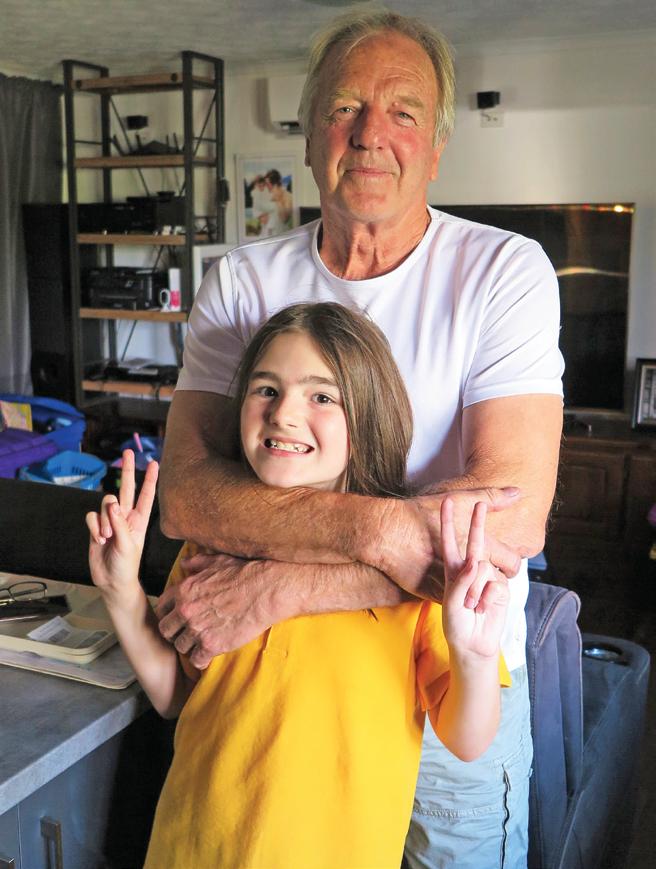
Legacy funding helps pay for the ‘little’ yet important things
Dennis Finch invites Insight Editor Jo Hales into his home to talk about his late wife Tania, a popular QAS officer who sadly lost her brave fight with breast cancer in 2017. Dennis is raising their beautiful daughter Zoe, 9. He talks about life without Tania and how the ‘little’ things, such as funding from the Queensland Ambulance Service Legacy Scheme (QAS Legacy) helps him support Zoe who has nonverbal autism.
Former QAS paramedic and Patient Transport Officer Tania Finch (nee Kennedy) was the kind of person who would light up a room the moment she walked in. She had a beautiful smile, was bubbly and stood out with her ever-changing hair colour. Most importantly, she was caring and compassionate and family and friends meant everything to her.
For a long time, Tania and Dennis, who has children from a previous relationship, tried for a much-wanted child of their own. After several attempts at IVF, the couple received the news Tania was pregnant with Zoe. Both were over the moon.
Tania would later say, ‘Zoe completed her’ and that ‘she was her greatest achievement’.
However, tragedy struck in 2014 when Tania received the devastating news she had breast cancer. Zoe was just 18 months old.
“Tania fought the cancer for a while and eventually went into remission,’’ Dennis said. “But one day just before Christmas in 2016 she was feeling a bit off, so she went and saw the doctor.
“He said, ‘I’ll let you have Christmas Day at home, but you are right back into hospital on Boxing Day’.
“After that, Tania was on all kinds of cancer drugs for months and she seemed to be going okay. Then in October 2017, she was told she had up to seven years to live, however, she ended up passing away five weeks after that diagnosis.”
Dennis, a Seaman, had just flown out to work on oil fields, 440 nautical miles offshore in the Timor Sea, when Tania’s condition suddenly deteriorated.
“When I was given the news, they turned the vessel around and brought me straight back to port and I flew back home,” Dennis said.
“I kept Tania at home as long as I could. But the week before she died, I couldn’t manage caring for her at home anymore. She was unable to walk, and I had a shoulder injury and didn’t have the strength to carry her.”
Before Tania was transported to hospital for her final journey, Dennis, his eldest daughter Amanda and close friends organised an End of Life party.
“We blocked off the street and all the neighbours and Tania’s friends attended. It was a beautiful event and a great way for everyone to say their goodbyes,” he said.
Zoe was five years old at the time of Tania’s passing, and Dennis said his intuitive daughter ‘whose autism gives her insight’, knew her Mum was dying the last time she saw her in the hospital.
“Zoe stood at the end of the bed and watched her Mum. I could tell she knew it was going to be the last time she saw her. A few days later, on 16 November, Tania passed away.”
She was just 46 years of age.



After Tania’s funeral, which included a QAS Guard of Honour, half of Tania’s ashes were scattered in Lake Tekapo in New Zealand. The place was special for Dennis and Tania, as they had married in the iconic Church of the Good Shepherd located on the shores of the famous lake.
“The remainder were scattered at Purlingbrook Falls at Springbrook National Park on the Gold Coast–another one of Tania’s favourite spots,” Dennis said.
In the days and weeks following Tania’s death, Dennis not only had to adjust to life without his much-loved wife and the mother of his youngest child, he also had to modify his work to care for Zoe.
“I ended up having to do a complete lifestyle change,” said Dennis who now works casual shifts on tugboats in the Port of Brisbane.
“I work casually so that I can say yes or no to work on that day. I pick and choose my shifts so that it fits in around Zoe.
“Tania’s friends also continue to be a really big help and look after Zoe on occasions when I work.”
An initiative that is ‘helping provide sanity’ for Dennis is the funding he receives from QAS Legacy.
“The funding is very helpful and goes towards Zoe’s extra-curricular activities,” Dennis said.
“When you are a single parent, the funding makes a big difference. I am very appreciative of the support…It means I don’t have to worry about finding extra money to buy things.”
The funding goes towards Zoe’s hip hop classes, ‘which are a great social interaction for her’, and swim school fees.
“It also helps out with certain programs and technology Zoe needs for education that are expensive and getting Zoe back to school at the start of each year and other school costs that occur throughout the year,” he said.
Dennis said the Legacy funding also assists with buying Zoe new clothes ‘because she is growing that quick’. “At the moment I need to buy Zoe a new wardrobe every eight to ten weeks,” Dennis said.
Other costs that Dennis encounters relate to specialist appointments.
“Zoe is attending psychology and speech pathologists who are working in conjunction to decrease her anxiety because when it gets close to her Mum’s birthday or the anniversary of her death, she glues herself to me like chewing gum,’’ Dennis said.
“I have to explain, ‘I’m just going outside to the car to get something’ to try and ease the anxiety.”
Dennis said Zoe’s autism was diagnosed around the same time Tania was first diagnosed with cancer.
“Zoe was walking and talking at nine months, she was very interactive with people. Then she started showing these little quirks,” he said.
The highly intelligent nine-year-old is currently attending Logan City Special School where ‘they have worked wonders with her,’ said Dennis.
“They teach kids the standard school curriculum, but they also teach them how to integrate into society when they leave school so that they become self-sufficient.
“The school bus picks Zoe up at my doorstep and drops her off at the doorstep. It gives her independence.”
For now, Dennis is busy planning a party in April to honour Tania on what would have been her 50th birthday.
“Zoe and I will have a cake and a celebration on 7 April, which is Tania’s birthday. Then we will have the party with family and friends on 10 April which is the birthday of Tania’s sister Sonia. Tania and Sonia always celebrated their birthdays together.”
Dennis said while he and Zoe miss Tania dearly, they always find comfort when visiting her favourite spots such as Purlingbrook Falls. “I try and take Zoe to Purlingbrook Falls every month and she knows we can go there whenever she wants to chat with her Mum,’’ Dennis said.
“We always take a bunch of flowers and throw them in the water. Nine times out of ten the carnations and roses, which were Tania’s favourite flowers, separate and go to the same spot and the others disappear.”
Opposite
Dennis and Zoe Finch.
Photo: Jo Hales. Above from left to right
Tania, Dennis and Zoe Finch.
Tania commenced her QAS career as a paramedic at Woodridge Station.
Zoe was Tania’s greatest achievement.
QAS Legacy is a charitable organisation that provides a range of services to QAS families who have suffered the loss of a loved one. You can support QAS Legacy by setting up a fortnightly payroll donation, with all donations of $2 and over tax-deductible. To make a donation, scan the QR code. You can also visit the QAS Legacy website or follow QAS Legacy Facebook.

